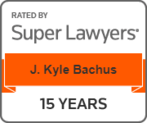Can I Sue My Insurance Company For Emotional Distress?
Insurance companies are supposed to be there to protect you when the unexpected happens. But what do you do if you feel your insurance company is not holding up their end of the deal after an accident? You may be thinking, “Can I sue my insurance company for emotional distress?” You’ll be surprised to find out that depending on your circumstances, you may be able to sue for emotional distress — legally known as non-compensatory damages.
Whether you have coverage for a home, a vehicle, or another prized asset, insurance companies have a legal duty to uphold their contractual obligations. If they don’t, speaking with an attorney can ensure your rights are represented and you get the compensation you deserve. Contact our bad faith Colorado attorneys to have an experienced legal representative look over your case.
Bachus & Schanker Wins – Over $1 Billion Recovered
- What Are Bad Faith Insurance Claims?
- Colorado's Bad Faith Insurance Laws
- What Damages Can Be Recovered for a bad faith Insurance Claim?
- Can I Sue for Emotional Distress?
- How an Attorney Can Help Prove Your Case
- Speak With an Attorney Today
- Related Bad Faith Insurance Resources
- You Deserve Fair Compensation
What Are Bad Faith Insurance Claims?
When you sign up for an insurance policy, you and the insurance company enter into a legally binding agreement. Each agreement brings with it its own terms and conditions, but both parties agree to act by those terms and conditions.
When an insurance company does not deliver on or honor the agreement outlined in the contract, this is known as a bad faith insurance claim. When an insurance company acts in bad faith, it can understandably cause emotional distress, including frustration, stress, and other types of intangible suffering.
Colorado’s Bad Faith Insurance Laws
When a policyholder feels that an insurance company has violated their contractual obligations, they can bring forward a bad faith claim against the insurance company. There are three different legal concepts a bad faith claim can be brought forward with. They include the following:
Breach of Contract
A breach of contract bad faith claim occurs when an insurance company violates its contractual obligations by failing to pay the valid claim. For an insured individual to have a successful case under breach of contract, they must prove:
- That a contract signed by both pirates exists
- The insured individual performed their duties outlined in the contract, or if they did not, they must show they were justified in not doing so
- The insurance company failed to uphold its side of the contract
- The insured suffered damages as a result of the defendant’s failure to uphold their side of the contract
Common Law Bad Faith
When bringing forward a common law bad faith claim, the insured individual alleges that the insurance company acted unreasonably with knowledge of or reckless disregard. In other words, their conduct was without proper cause.
Statutory Bad Faith
An insured individual can file a statutory bad faith claim under the C.R.S. § 10-3-1116(1). Under this statute, an insurer would have been the victim of an unreasonably delayed or denied claim that should have been covered and paid promptly. It allows a plaintiff to seek attorney fees and court costs in addition to two times the covered benefit.
A claim of statutory bad faith offers a victim remedy in addition to, not in place of, common law bad faith.
Filing a Regulatory Complaint
Victims of a bad faith claim may also want to file a regulatory complaint against the insurance company with the Colorado Department of Regulatory Agencies. Filing a complaint allows the state to further investigate the company’s business practices.
Examples of Bad Faith Insurance Practices
Bad faith insurance claims can take many forms and may look different from case to case. However, some tactics are more common than others. Common examples of bad faith practices include:
- Delaying the processing of claims and failing to provide a valid reason
- Conducting incomplete or biased investigations into your claim, which then leads to an unfair denial or undervaluation
- Denying a claim that should be covered under your policy and not providing a reasonable explanation as to why
- Deliberately misinterpreting or misrepresenting the language in your contract so that it favors the insurance company and not you as the policyholder
- Offering a settlement amount that is significantly lower than the actual value of the claim
- Failing to respond to questions, clarify concerns, or communicate with the policyholder
- Taking retaliatory action against policyholders, including raising premiums or canceling policies
- Using intimidation or coercion to pressure a policyholder into accepting a lowball settlement or dropping the claim entirely
- An insurance company providing false or misleading information about your policy coverage or benefits
- Refusing to negotiate or settle a claim in good faith even when the liability is reasonably clear
Bad Faith Claims in Colorado: Goodson v. American Standard Insurance Co.
While most insurance companies are ethical in how they conduct their business, there have been cases where bad faith claims were on full display, prompting policyholders to sue. One such case where a plaintiff successfully sued for emotional distress is that of Goodson v. American Standard Insurance Co. This case would go on to establish the common law basis of bad faith insurance claims in Colorado.
In 1995, Daw Goodson and her two minor children were injured in an automobile accident after a vehicle struck them from behind while at a stop light. The American Standard Insurance Company denied her $8,000 claim from the onset despite sound allegations proving her case.
Despite her efforts, the insurance company would continue making excuses, denying the claim, saying that Goodson and her children received medical care from an out-of-network provider, Goodson’s policy was ineffective, and denying that the injuries were because of the car accident, to begin with.
In 1998, Goodson sued, claiming breach of contract, bad faith breach of insurance contract, outrageous conduct, and willful and wanton breach of insurance contract.
The jury would eventually return a guilty verdict, awarding Goodson and her children $75,000 in actual damages and $75,000 in punitive damages.
What Damages Can Be Recovered for a bad faith Insurance Claim?
Under C.R.S. 10-3-1116(1), you can recover “reasonable attorney fees and court costs and two times the covered benefit.”
Additionally, depending on the allegations you make in your case, you can seek economic damages like calculable costs related to your claim and non-economic damages like emotional distress.
Can I Sue for Emotional Distress?
Yes, you can sue for emotional distress under the common law standard, but it can be hard to prove. This is because you must show that the result of your claim denial caused you pain and suffering or emotional distress. This intangible loss can be more difficult to prove than, say, the cost of medical bills.
How an Attorney Can Help Prove Your Case
A Colorado bad faith insurance attorney can collect and document the evidence you need to prove that your case caused you emotional distress. This evidence collection is critical in building a robust case and can help you recover the compensation you deserve.
Speak With an Attorney Today
If you feel you have been the victim of a bad faith insurance claim, call Bachus & Schanker today. Our team is here to help you recover the compensation you may be entitled to if you have been the victim of a bad faith insurance claim.
Sources:
C.R.S. § 10-3-1116(1). (2024).
Filing a Complaint with a DORA Division. (2024).
Goodson v. American Standard Insurance Co. (2024).
Related Bad Faith Insurance Resources
You Deserve Fair Compensation
Don’t let the insurance companies intimidate you into accepting less than you deserve. We’re ready to fight for you.














